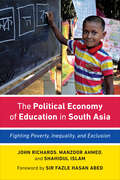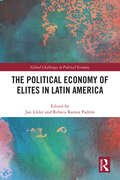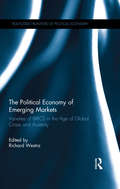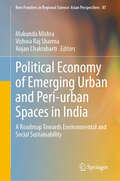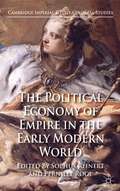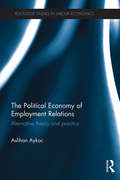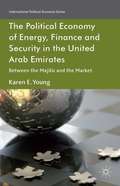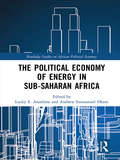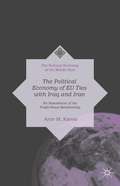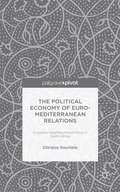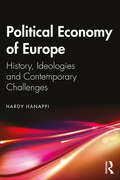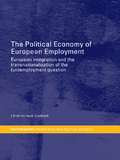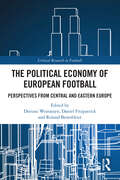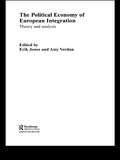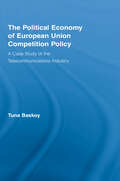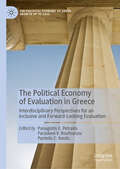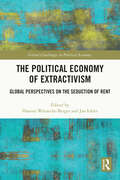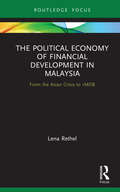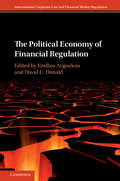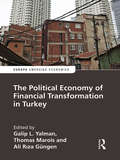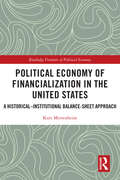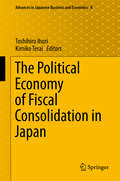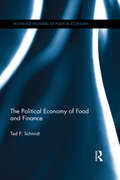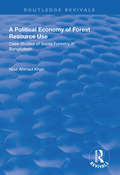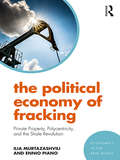- Table View
- List View
The Political Economy of Education in South Asia: Fighting Poverty, Inequality, and Exclusion
by John Richards Manzoor Ahmed Md. Shahidul IslamWith the exception of Sri Lanka, South Asian countries have not achieved quality basic education – an essential measure for escaping poverty, inequality, and social exclusion. In The Political Economy of Education in South Asia, John Richards, Manzoor Ahmed, and Shahidul Islam emphasize the importance of a dynamic system for education policy. The Political Economy of Education in South Asia documents the weak core competency (reading and math) outcomes in government primary schools in India, Pakistan, Bangladesh, and Nepal, and the consequent rapid growth of non-government schools over the last two decades. It compares the training, hiring, and management of teachers in South Asian schools to successful national systems ranging from Singapore to Finland. Discussing reform options, it makes the case public good and public priorities are better served when both public and non-government providers come under a strong public policy and accountability framework. The Political Economy of Education in South Asia draws on the authors' broad engagement in education research and practice in South Asia, as well as analysis by prominent professors of education and NGO leaders, to place basic education in a broad context and make the case that universal literacy and numeracy are necessary foundations for economic growth.
The Political Economy of Elites in Latin America (Global Challenges in Political Economy)
by Jan Ickler Rebeca Ramos PadrónRecent years have seen renewed interest in elites around the world, and their interconnection with power, privilege, social stratification, and social change. The contributors to this edited volume explore the many facets of the role of elites in the political economy of Latin America: their position within society, their impact upon the economy, and their influence within governing institutions.The book demonstrates that in Latin America, as in many other parts of the world, structural change and movements toward more just, inclusive, and sustainable societies seem impossible without the involvement of elites at some level. This raises important questions: Under what conditions do elites push for reform? How do elites react to societal and economic challenges and changes? To what extent can popular classes successfully pressure elites? Bringing together a selection of case studies covering different Latin American countries, the book focuses on three key themes to address these questions: first, it explores how elites react to economic and societal challenges with some chapters looking at moments of change, as well as measures taken by individual elites to alter the status quo. Second, it seeks to understand the interrelation between external and domestic factors that engender elite action including global markets, geopolitics, state institutions, social forces, and the internal structure of elite groups. Third, it reflects upon methodological questions of studying elites in Latin America, laying bare the potential pitfalls and offering possible routes to further inquiry.This book will be vital reading for researchers in political economy, development economics, economic sociology, and Latin American studies more broadly.
The Political Economy of Emerging Markets: Varieties of BRICS in the Age of Global Crises and Austerity (Routledge Frontiers of Political Economy)
by Richard WestraRapid and sustained growth in the twenty-first-century global economy of large developing economies including Brazil, Russia, India, China, and South Africa, has captivated policy-makers and popular business press pundits alike. The coining of the new acronym BRICS and widespread adoption in international economics discourse of the designation "emerging markets" is symptomatic of that interest. The Political Economy of Emerging Markets situates the BRICS phenomena in the global economic context of advanced economies continuing to languish in recession and hovering over a deflationary abyss several years after the meltdown. A key question this volume seeks to answer is whether the BRICS and so-called "emerging market" phenomenon is really the new miracle it is presented as, offering new or modified varieties of reloaded capitalist development to the world, or yet another mirage. Written by ten leading global experts, this book answers the tough questions over BRICS and emerging markets potentially realizing new varieties of reloaded capitalism. It is not only international and interdisciplinary but uniquely multiperspectival. Theories framing chapters are not of one genre, but generate theoretical debate at the frontier of knowledge in political economy along with nuanced empirical analysis which flows from it. This book is of great importance to those who study political economy, development economics and international political economy.
Political Economy of Emerging Urban and Peri-urban Spaces in India: A Roadmap Towards Environmental and Social Sustainability (New Frontiers in Regional Science: Asian Perspectives #81)
by Mukunda Mishra Vishwa Raj Sharma Anjan ChakrabartiThis book addresses the “urban” and “peri-urban” spaces in India within a single frame. The reasoning is that while the former is studied for its transformation towards more value addition in terms of power and neoliberal economic viabilities, the latter is the land of visible transformation of the built environment. It acquaints readers with how the processes of circulation of migrant labour, the shift in occupations of landowning groups, and the residential cohabitation of diverse social groups contribute to re-scripting social relations, green spaces, and the forging of new subjectivities. The chapters of the book speak of the need to create sustainable cities for uncertain futures, with a quest to reverse global climate change and make an effort to halt urbanization at the cost of the natural ecosystem, all of which have become more urgent in the post-pandemic years. The book addresses different aspects of the evolutionary urban and peri-urban spaces in India amidst the conflict of the environmental and social sustainability agendas with the neo-liberal ascendancy. The integration of urban and peri-urban areas with emerging political and economic equations and the involvement of multiple disciplines to work in tandem for a deep insight into the complex phenomena incorporating diverse actors validate the need for such a volume. This edited volume seeks to record how all these stakeholders—state agencies, political leaders, businessmen, workers, investors, households, builders, real estate intermediaries, business owners, migrants, and many more with their varying capacities to influence outcomes on the ground—interact with one another. It also shows how multiple power relationships are calibrated and recalibrated to produce urban and peri-urban spaces in diverse ways in many parts of India.
The Political Economy of Empire in the Early Modern World (Cambridge Imperial and Post-Colonial Studies Series)
by Sophus A. Reinert Pernille RøgeThis collection of essays draws on fresh readings of classic texts as well as rigorous research in the archives of Europe's greatest imperial power. Its contributors paint a powerful picture of the nature and implementation of political economy in the long eighteenth century, from the East to the West Indies.
The Political Economy of Employment Relations: Alternative theory and practice (Routledge Studies in Labour Economics)
by Aslihan AykacEmployment has changed dramatically in the last few decades with the onset of neoliberal globalization. This change has become the objective of inquiry from different perspectives, such as development studies, labour economics or industrial relations, focusing on different units of analysis. The Political Economy of Employment Relations provides an exceptional contribution to existing literature by presenting alternative theory and practice on employment relations. It is within this critical theoretical intervention that solidarity economies emerge as a unique theoretical construct as well as a unit of analysis to expose the alternative paths that employment relations may resort to against the contemporary challenges of neoliberal globalization. This book analyses globalization, global economic crisis, and issues of work and labour from the point of view of the developing world, presenting local case studies from countries including the USA, India, Spain and Greece, and outlining alternative approaches to global challenges. This volume has relevance to those with an interest in industrial relations, sociology of work and occupations, labour economics and development economics.
The Political Economy Of Energy, Finance And Security In The United Arab Emirates
by Karen E. YoungThis book explores the process of policymaking and implementation in the finance, energy and security sectors in the United Arab Emirates. It looks at the role of informal advisory networks in a nascent private sector, federal politics, and historical ties in foreign relations.
The Political Economy of Energy in Sub-Saharan Africa (Routledge Studies on the Political Economy of Africa)
by Lucky E. Asuelime Andrew Emmanuel OkemA deepening ecological crisis is rearing its head in sub-Saharan Africa, as it faces a myriad of challenges in regards to the development of its energy sector. The ‘dirty now and clean up later’ approach to the environment has a strong appeal, particularly because it is often thought of as the last place to try to edge in another priority - especially if that priority is perceived by many to be an economic luxury. Asuelime and Okem bring together a team of specialist contributors who investigate to what extent sub-Saharan Africa has displayed foresight or politico-economic integrity. The book shows the state’s ability to meet the demands of provision of energy in sub-Saharan Africa has led to heavy investments in infrastructure, transmission and distribution of energy to the citizens. However, the inefficiencies, corruption and unhealthy bureaucratic challenges that accompany this have led urgent problems, which will be thoroughly explored in this book. The Political Economy of Energy in Sub-Saharan Africa will be of interest to students and scholars of African Studies, Development Studies, political science and environment.
The Political Economy of EU Ties with Iraq and Iran
by Amir M. KamelThis book analyzes the failure of the EU's peace-through-trade policy in Iraq and Iran between 1979 and 2009 from a theoretical and empirical perspective. The author adds to the trade-peace theory debate and provides evidence supporting the need to review the EU's peace-through-trade-policy towards Iraq and Iran, and in general.
The Political Economy of Euro-Mediterranean Relations: European Neighbourhood Policy in North Africa
by Christos KourtelisThe author analyses the implementation of the agricultural and industrial parts of the European Neighbourhood Policy (ENP) in Egypt, Tunisia and Morocco. This study forms the first comprehensive attempt to examine the EU-led reforms and initiatives in the two sectors up until the beginning of the Arab Spring. It also evaluates the development of the policy after the changes of the regimes in Tunisia and Egypt until the 2014 elections which brought Sisi in power in Egypt and Essebsi in Tunisia. Following a sectoral approach to assess the implementation of the ENP, Christos Kourtelis investigates which interest groups win and which lose from the policy.
Political Economy of Europe: History, Ideologies and Contemporary Challenges
by Hardy HanappiThe development of European unification has reached a critical stage. Despite 75 years of peace, increases in welfare, and growth since World War 2, there is now a growing scepticism of the European agenda from various quarters, most notably embodied in the exit of the United Kingdom from the European Union. To fully understand the dynamics at work, this book presents an introduction to the development of the political economy of Europe from 1900 to 2020. The first part of the book provides an overview of European economic and political history from 1900 to the present. It is clear from this history that Europe’s population, and most notably its leaders, have been deeply influenced by ideology during this time. This sets the context for the second part of the book, which takes a closer look at some major paradigms framing European dynamics: (1) the market-oriented paradigm, (2) Marx’s paradigm, and (3) the fascist paradigm. In this part, the essential core of each of these paradigms is presented and critiqued. In the third part, the current bottlenecks of European evolution (the migration crisis, Brexit, rise of new Fascism, the climate crisis, the COVID-19 pandemic) are investigated in the light of a possible emergence of a new scientific paradigm. Europe’s role in the global division of labour – its possibility to serve as a role model for the advantages of democratically governing a highly diverse set of populations – is also explained. This book is an ideal text for students undertaking courses on the political economy of Europe in either economics or politics departments.
The Political Economy of European Employment: European Integration and the Transnationalization of the (Un)Employment Question (RIPE Series in Global Political Economy)
by Henk OverbeekThis edited collection examines unemployment in Europe in the context of globalisation, the implementation of European Monetary Union and the Eastern enlargement of the EU. It combines theoretical chapters with detailed case-studies of Britain, The Netherlands, Italy, Spain and Central Europe.
The Political Economy of European Football: Perspectives from Central and Eastern Europe (Critical Research in Football)
by Dariusz Wojtaszyn, Daniel Fitzpatrick and Roland BenedikterThis book explores the contemporary dynamics of European football’s political economy, mapping the various market and regulatory forces that shape its current position and development.Offering a conceptual framework for understanding political economy as applied to the study of football, this book presents in-depth case studies from Central and Eastern Europe – a region largely underexplored in the research literature – that enable the reader to gain a sense of the rich history and diversity of the economic and social contexts in which European football is shaped. The first part of this book sets out the market structure of football in Europe and considers how key trends of globalisation and hypercommercialisation have been addressed through attempts to incentivise and regulate the football market. It presents a theoretical framework for political economy in football and explores key issues including football and economic development; UEFA’s ‘Financial Fair Play’ regulations; sponsorship in football; and the socio-economic conditions of hooligan violence. The second part of the book looks more closely at Central and Eastern Europe. Presenting case studies of aspects of political economy in football in Romania, Poland, East Germany, Austria and Hungary (including development of the women’s game), this book shows how the economic development of European football has been uneven, not only subject to global trends but also dependent on local historical, political, economic and organisational conditions.Opening up new perspectives on the complex interactions between states, sports organisations, markets and society, this book will be fascinating reading for anybody with an interest in football, the history, politics or business of sport, or political economy as a field of scholarly enquiry.
The Political Economy of European Integration: Theory and Analysis
by Erik Jones Amy VerdunThis book provides a balanced introduction to diverse political economy perspectives on different aspects of European integration, demonstrating both the importance and the potential of research in this area. The volume includes three types of chapters: broad literature reviews, narrower applications of existing arguments, and new syntheses of competing claims. The authors also present a critical appraisal of how scholars in the EU and US use theory to understand European integration, and examine issues such as citizens' attitudes, perceptions and preferences of actors, the role of non-state actors, principle-agent questions, and the role and the autonomy of European institutions.This empirically informed and methodologically rigorous volume will be of great interest to students and researchers in the fields of comparative political economy, EU studies, international political economy and international organizations.
The Political Economy of European Union Competition Policy: A Case Study of the Telecommunications Industry (New Political Economy Ser.)
by Tuna BaskoyIn the European Union (EU), competition policy occupies a central place amongst other EU public policies and is the first truly supranational public policy regulating market competition. One of the stated objectives of EU competition policy is to prevent excessive concentration of economic power in the hands of a few. This book investigates the pol
The Political Economy of Evaluation in Greece: Interdisciplinary Perspectives for an Inclusive and Forward-Looking Evaluation (The Political Economy of Greek Growth up to 2030)
by Panagiotis E. Petrakis Pantelis C. Kostis Paraskevi V. BoufounouThis contributed volume explores the relationships between politics, economics, and evaluation. With a special focus on Greece, it addresses how evaluations within different sectors impact policymaking and explains what this means for sustainable development. Featuring interdisciplinary perspectives on economic policy evaluation for inclusive and future-forward public policy, the chapters rethink and reform evaluation to meet modern economic challenges. The book outlines the concept and principles of resource allocation in evaluation, offering a framework for economic transformation. It highlights the role of evaluation in achieving sustainable development. It provides a new way to measure the quality of public policy, governance, and economic policy.
The Political Economy of Extractivism: Global Perspectives on the Seduction of Rent (Global Challenges in Political Economy)
by Hannes Warnecke-Berger Jan IcklerFor many countries, primarily in the Global South, extractivism – the exploiting and exporting of natural resources – is big business. For those exporting countries, natural resource rents create hope and promise for development which can be a seductive force. This book explores the depth of extractivism in economies around the world. The contributions to this book investigate the connection between the political economy of extractivism and its impact on the socio-political fabric of natural resource exporting societies in Asia, Africa, Latin America, and Eastern Europe. The book engages with a comparative perspective on the persistence of extractivism in these four different world regions. The book focuses on the formative power of rents and argues that rents are seductive. The individual contributions flesh out this seductive force of rents on different political scales and how this seduction affects a variety of actors. The book investigates how these actors react to the prevalence of rent, how they align or break with specific political and economic strategies, and how myths of resource-driven development play out on the ground. The book, therefore, underlines that rent theory bridges current debates in different area communities and offers fresh insights into extractivist societies’ social, economic, and political dynamics. This book will be of significant interest to readers in political economy, political science, development studies, and area studies.
The Political Economy of Financial Development in Malaysia: From the Asian Crisis to 1MDB (Routledge Focus on Economics and Finance)
by Lena RethelCurrent inquiries into the political economy of financial policymaking in Malaysia tend to focus on the high-level drama of crisis politics or simply point to the limited impact of post-crisis financial reforms, given that politico-business relations have remained close. In so doing, pundits ignore a number of intriguing questions: what is the relationship between financial development and financialisation and how has it played out in the Malaysian context? And more generally: how can a country like Malaysia become significantly more financially developed, yet fail to emancipate the financial system from political control; a core element of the financial development discourse? To unravel the complexities of this puzzle, this book subjects the history and contemporary practices of financial policymaking in Malaysia to scrutiny. It argues that to understand financial development in Malaysia, its progress and reversals, it is important to conceptualise it as a political, rather than a merely technical process. In so doing, the book echoes a more profound concern in the political economy literature, namely the evolving relationship between states and markets, and the supposed retreat or reassertion of the state at a time of increasing (financial) globalisation. The book can generate further insights into the evolving role of the state with regard to broader processes of development and marketisation, as they relate specifically to finance.
The Political Economy of Financial Regulation (International Corporate Law and Financial Market Regulation)
by Emilios Avgouleas David C. DonaldThis collection of cutting-edge scholarship examines the law and policy of financial regulation using a combination of conceptual analysis and strong empirical research. The book's authors range from global leaders to rising stars in the field, all of whom shed light on complex questions of financial sector regulation theory and practice in key economies ranging from the EU to China. Key topics include the role of law in constituting financial markets, the efficiency of markets, the role of interest groups in shaping financial regulation, the interdependence and interactions of international financial regulation with international trade and monetary regimes, and problems of regulation in state capitalism economies. This exciting volume opens the road for further enrichment of the academic and policy-making dialogue on financial regulation and regulatory practice, and reflects new trends in legal and social-science scholarship.
The Political Economy of Financial Transformation in Turkey (Europa Perspectives: Emerging Economies)
by Galip Yalman Thomas Marois Ali Rıza GüngenThis volume provides a comprehensive study of Turkey’s financial transformation into one of the most dynamic, if not trouble-free, emerging capitalisms. While this financial evolution has underwritten Turkey’s dramatic economic growth, it has done so without ameliorating the persistently exploitative and unequal social structures that characterize neoliberalism today. This edited volume, written by an interdisciplinary range of political economists, critically examines Turkey’s financial transformation, contributing to debates on the nature of peripheral financialization. Eschewing economistic interpretations, The Political Economy of Financial Transformation in Turkey underscores both the quantitative significance of exponential growth in financial flows and investments, and the qualitative importance of the state’s institutional restructuring around financial imperatives. The book presents today’s reality as historically rooted. By understanding the choices made under the new Republic (from 1923 onwards), one can better locate the changes launched as a newly liberalizing society (since 1980). Likewise, the decisions made in response to Turkey’s 2001 financial crisis spurred a tectonic break in state–market–society financial relations. The waves of change have reached far and wide: from corporate strategies of accumulation and growth to small- and medium-sized enterprises’ strategies of financial survival; from how finance has penetrated the provisioning of housing to how households have become financialized. Put together, one grasps the complexity and historicity of the power of contemporary finance. One also sees that the changes made have not been class-neutral, but have entailed elevating the interests of major capital groups, particularly financial capital, above the interests of the poor and workers in Turkey. Nor are these changes constrained to its national borders, as what transpires domestically contributes to the making of a financialized world market. Through this ‘Made in Turkey’ approach the contributions in this volume thus challenge dominant understandings of financialization, which are derived from the advanced capitalisms, by sharing the specificity of emerging capitalisms such as Turkey.
Political Economy of Financialization in the United States: A Historical–Institutional Balance-Sheet Approach (Routledge Frontiers of Political Economy)
by Kurt MettenheimCombining balance sheet analysis with historical institutional analysis, this book traces the evolution of social sector financial balance sheets in the US from 1960 to 2018. This innovative historical-institutional approach, ranging from the micro level of households to the macro level of the federal government, reveals that the displacement of households by banks has been a long-term process. This gradual compounding of financialization is at odds with widely accepted views about financialization, contemporary banking theory, financial intermediation theory, and post-Keynesian and endogenous money approaches. The book returns to time-tested traditional principles of banking and taps unexpected affinities about market failures in transaction cost economics, financial intermediation theory, and core ideas in classic modern political and social economy about economic moralities and social reactions of self-defense against unfettered markets. This book provides an alternative explanation for the rise of finance and new ways to think about averting financialization and its devastating consequences. This book marks a significant contribution to the literature on financialization, social economics, banking, and the American political economy.
The Political Economy of Fiscal Consolidation in Japan
by Toshihiro Ihori Kimiko TeraiThis book investigates the reasons for persistent public deficits and delayed fiscal reform in Japan, placing a special emphasis on political economy aspects. Japan is confronted with the need to pursue fiscal discipline for fiscal consolidation and implement structural reforms for reorganizing fiscal expenditures. Focusing on particular policy fields including social security, female labor supply, public works, and intergovernmental transfer schemes, the book clarifies economic and political elements that have hindered effective steps toward these two goals. Facing population aging and a business downturn, the Japanese government was urged to increase social security expenditures and the budget for Keynesian stimulus policies. As elucidated in the book, the institutional design has worked to over-represent the demands of elderly generations and local interest groups and to expand these expenditures. Rigorous theoretical and numerical analyses reported throughout the book consequently provide readers with insights into incentive designs and institutional reforms necessary for fiscal consolidation, also presenting points of view for public policy and public debate.
The Political Economy of Food and Finance (Routledge Frontiers of Political Economy)
by Ted P. SchmidtThe financialization, globalization and industrialization of our food systems make it increasingly difficult to access quality fresh food. In fact, the industrialized global food system is creating products that are less food-like, engendering growing questions about the health and safety of our food supply. In addition, the bio-engineering of food commodities is another factor influencing the growth of industrial farming for an increasingly homogenized, globalized market. This book describes the financialization process in commodity futures markets which transformed commodities into an asset class. Incorporated into the portfolio decisions of investors, commodity prices now behave like all asset prices, becoming more volatile and subject to periodic bubbles. As commodity prices were driven higher in the 2000s, farmland became more valuable, setting off a global land grab by investors, nations, and corporations. More recently, under the financialization food regime, slow growth and low returns encouraged merger activity driven by private equity firms, with food industry corporations as prime targets, leading to increased industry concentration. With government policy focused on supporting corporate interests, there has been a global reaction to the current food system. The food sovereignty movement is taking on the interests behind the global land grab, and the regional food movement in cities across the U.S. is hitting corporations at the bottom line. Food corporations are listening. Is the food movement winning? This book is of interest to those who study political economy, financialization and agriculture and related studies, as well as food systems and commodity future markets.
A Political Economy of Forest Resource Use: Case Studies of Social Forestry in Bangladesh (Routledge Revivals)
by Niaz Ahmed KhanPublished in 1998. An International monograph publishing series covering new research into the ‘green’ issues such as government, corporate and public responses to environmental hazards, the economics of green policies and the effectiveness of environmental protection programmes.
The Political Economy of Fracking: Private Property, Polycentricity, and the Shale Revolution (Economics in the Real World)
by Ilia Murtazashvili Ennio PianoOver the past two decades, "fracking" has led to a revolution in shale gas production. For some, shale gas promised economic opportunities, cheaper energy bills, and an alternative to coal. For others, shale gas was fool’s gold. Critics contend that the shale boom has occurred in a regulatory Wild West, that the response has been fractured and ineffective, or that the harmful environmental and health consequences exceed the benefits from shale gas production. The Political Economy of Fracking argues that the criticism of the shale revolution has been misplaced. The authors use insights from a diversity of perspectives in political economy to understand why the shale boom occurred, who won in the race for shale, and who was left behind. The book explains how private property rights and entrepreneurs led to the shale boom. It contends that polycentric governance, which encourages a diversity of regulatory responses, is a virtue because it generates knowledge about the most appropriate ways to regulate shale development. Private property rights and political institutions that provide for local self-governance also helped to ensure that the benefits of shale gas production exceeded its costs. The authors make the case for fracking shale gas using evidence from shale-producing countries from around the world, comparing them to those that have fallen behind in the shale race. They show that private property rights and markets have been a source of innovation and dynamism and that a diversity of regulatory responses is appropriate to govern shale gas development. This book is insightful reading for academics and professionals interested in the shale boom, the fracking industry in general, and regulatory policy.
